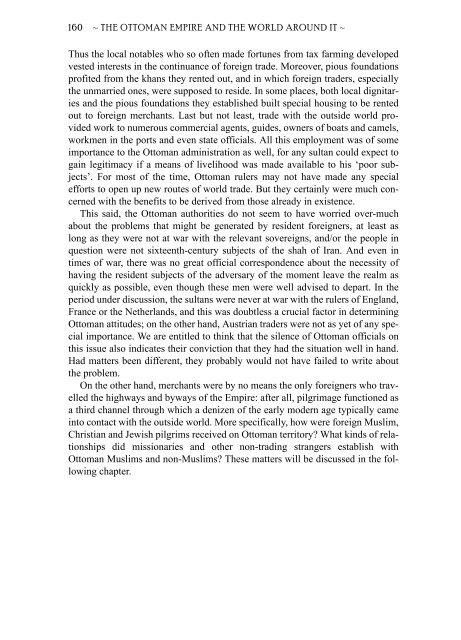The Ottoman Empire and the World Around It - Course Information
The Ottoman Empire and the World Around It - Course Information
The Ottoman Empire and the World Around It - Course Information
Create successful ePaper yourself
Turn your PDF publications into a flip-book with our unique Google optimized e-Paper software.
160 ~ THE OTTOMAN EMPIRE AND THE WORLD AROUND IT ~<br />
Thus <strong>the</strong> local notables who so often made fortunes from tax farming developed<br />
vested interests in <strong>the</strong> continuance of foreign trade. Moreover, pious foundations<br />
profited from <strong>the</strong> khans <strong>the</strong>y rented out, <strong>and</strong> in which foreign traders, especially<br />
<strong>the</strong> unmarried ones, were supposed to reside. In some places, both local dignitaries<br />
<strong>and</strong> <strong>the</strong> pious foundations <strong>the</strong>y established built special housing to be rented<br />
out to foreign merchants. Last but not least, trade with <strong>the</strong> outside world provided<br />
work to numerous commercial agents, guides, owners of boats <strong>and</strong> camels,<br />
workmen in <strong>the</strong> ports <strong>and</strong> even state officials. All this employment was of some<br />
importance to <strong>the</strong> <strong>Ottoman</strong> administration as well, for any sultan could expect to<br />
gain legitimacy if a means of livelihood was made available to his ‘poor subjects’.<br />
For most of <strong>the</strong> time, <strong>Ottoman</strong> rulers may not have made any special<br />
efforts to open up new routes of world trade. But <strong>the</strong>y certainly were much concerned<br />
with <strong>the</strong> benefits to be derived from those already in existence.<br />
This said, <strong>the</strong> <strong>Ottoman</strong> authorities do not seem to have worried over-much<br />
about <strong>the</strong> problems that might be generated by resident foreigners, at least as<br />
long as <strong>the</strong>y were not at war with <strong>the</strong> relevant sovereigns, <strong>and</strong>/or <strong>the</strong> people in<br />
question were not sixteenth-century subjects of <strong>the</strong> shah of Iran. And even in<br />
times of war, <strong>the</strong>re was no great official correspondence about <strong>the</strong> necessity of<br />
having <strong>the</strong> resident subjects of <strong>the</strong> adversary of <strong>the</strong> moment leave <strong>the</strong> realm as<br />
quickly as possible, even though <strong>the</strong>se men were well advised to depart. In <strong>the</strong><br />
period under discussion, <strong>the</strong> sultans were never at war with <strong>the</strong> rulers of Engl<strong>and</strong>,<br />
France or <strong>the</strong> Ne<strong>the</strong>rl<strong>and</strong>s, <strong>and</strong> this was doubtless a crucial factor in determining<br />
<strong>Ottoman</strong> attitudes; on <strong>the</strong> o<strong>the</strong>r h<strong>and</strong>, Austrian traders were not as yet of any special<br />
importance. We are entitled to think that <strong>the</strong> silence of <strong>Ottoman</strong> officials on<br />
this issue also indicates <strong>the</strong>ir conviction that <strong>the</strong>y had <strong>the</strong> situation well in h<strong>and</strong>.<br />
Had matters been different, <strong>the</strong>y probably would not have failed to write about<br />
<strong>the</strong> problem.<br />
On <strong>the</strong> o<strong>the</strong>r h<strong>and</strong>, merchants were by no means <strong>the</strong> only foreigners who travelled<br />
<strong>the</strong> highways <strong>and</strong> byways of <strong>the</strong> <strong>Empire</strong>: after all, pilgrimage functioned as<br />
a third channel through which a denizen of <strong>the</strong> early modern age typically came<br />
into contact with <strong>the</strong> outside world. More specifically, how were foreign Muslim,<br />
Christian <strong>and</strong> Jewish pilgrims received on <strong>Ottoman</strong> territory? What kinds of relationships<br />
did missionaries <strong>and</strong> o<strong>the</strong>r non-trading strangers establish with<br />
<strong>Ottoman</strong> Muslims <strong>and</strong> non-Muslims? <strong>The</strong>se matters will be discussed in <strong>the</strong> following<br />
chapter.


